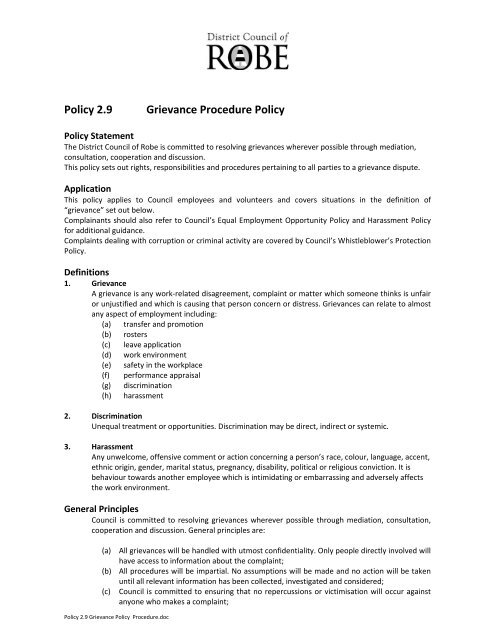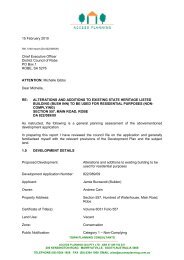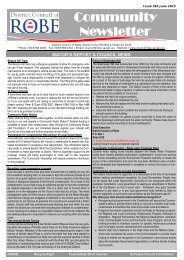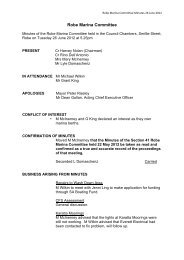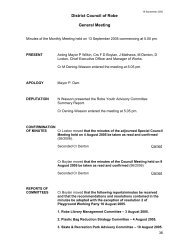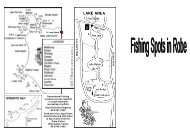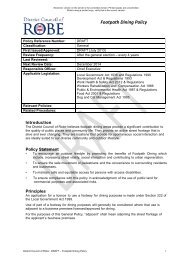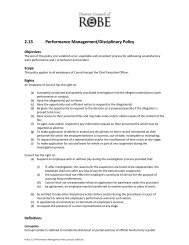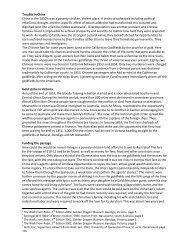Policy 2.9 Grievance Procedure Policy - Robe
Policy 2.9 Grievance Procedure Policy - Robe
Policy 2.9 Grievance Procedure Policy - Robe
Create successful ePaper yourself
Turn your PDF publications into a flip-book with our unique Google optimized e-Paper software.
<strong>Policy</strong> <strong>2.9</strong><br />
<strong>Grievance</strong> <strong>Procedure</strong> <strong>Policy</strong><br />
<strong>Policy</strong> Statement<br />
The District Council of <strong>Robe</strong> is committed to resolving grievances wherever possible through mediation,<br />
consultation, cooperation and discussion.<br />
This policy sets out rights, responsibilities and procedures pertaining to all parties to a grievance dispute.<br />
Application<br />
This policy applies to Council employees and volunteers and covers situations in the definition of<br />
“grievance” set out below.<br />
Complainants should also refer to Council’s Equal Employment Opportunity <strong>Policy</strong> and Harassment <strong>Policy</strong><br />
for additional guidance.<br />
Complaints dealing with corruption or criminal activity are covered by Council’s Whistleblower’s Protection<br />
<strong>Policy</strong>.<br />
Definitions<br />
1. <strong>Grievance</strong><br />
A grievance is any work‐related disagreement, complaint or matter which someone thinks is unfair<br />
or unjustified and which is causing that person concern or distress. <strong>Grievance</strong>s can relate to almost<br />
any aspect of employment including:<br />
(a) transfer and promotion<br />
(b) rosters<br />
(c) leave application<br />
(d) work environment<br />
(e) safety in the workplace<br />
(f) performance appraisal<br />
(g) discrimination<br />
(h) harassment<br />
2. Discrimination<br />
Unequal treatment or opportunities. Discrimination may be direct, indirect or systemic.<br />
3. Harassment<br />
Any unwelcome, offensive comment or action concerning a person’s race, colour, language, accent,<br />
ethnic origin, gender, marital status, pregnancy, disability, political or religious conviction. It is<br />
behaviour towards another employee which is intimidating or embarrassing and adversely affects<br />
the work environment.<br />
General Principles<br />
Council is committed to resolving grievances wherever possible through mediation, consultation,<br />
cooperation and discussion. General principles are:<br />
(a) All grievances will be handled with utmost confidentiality. Only people directly involved will<br />
have access to information about the complaint;<br />
(b) All procedures will be impartial. No assumptions will be made and no action will be taken<br />
until all relevant information has been collected, investigated and considered;<br />
(c) Council is committed to ensuring that no repercussions or victimisation will occur against<br />
anyone who makes a complaint;<br />
<strong>Policy</strong> <strong>2.9</strong> <strong>Grievance</strong> <strong>Policy</strong> <strong>Procedure</strong>.doc
(d) Complaints will be dealt with in a timely manner.<br />
(e) Seeking redress of a trivial or vexatious issue through a grievance procedure will not be<br />
tolerated.<br />
Rights<br />
1. Employees Making a Complaint<br />
All employees have the right:<br />
(a) to make a complaint to his/her line manager/supervisor, Deputy Chief Executive Officer or a<br />
person at an appropriate level within the organisation;<br />
(b) to have their grievance considered fairly;<br />
(c) to keep notes, copies of written documents or diary record of all incidents and any<br />
responses, including dates, times, witnesses and other details;<br />
(d) to seek advice or assistance from a union or professional association;<br />
(e) to seek advice from, or complain to, an external body such as the Equal Opportunity<br />
Commission.<br />
2. Employees that are the Subject of a Complaint<br />
A person who is the subject of a complaint has the right:<br />
(a) to be informed verbally of what behaviour they are being accused of;<br />
(b) to respond to the allegations and cite witnesses if appropriate;<br />
(c) to fair treatment and procedures;<br />
(d) to be heard by an unbiased person.<br />
Responsibilities<br />
1. Chief Executive Officer and Managers<br />
The Chief Executive Officer and Managers will:<br />
(a) ensure that all employees are aware of the procedures set out in this policy;<br />
(b) be responsible for handling serious and complex grievances which are referred by line<br />
managers/supervisors or brought directly to them by employees.<br />
2. Line Managers/Supervisors<br />
Line Managers and Supervisors:<br />
(a) will ensure that all employees are aware of the procedures set out in this policy;<br />
(b) are the first point of receipt and will be responsible for investigation and resolution of staff<br />
grievances wherever possible.<br />
3. Deputy Chief Executive Officer<br />
The Deputy Chief Executive Officer will:<br />
(a) provide advice and assistance and where necessary, investigate the grievance, particularly if<br />
the grievance relates to a discrimination, harassment or personnel/industrial matter.<br />
<strong>Grievance</strong> <strong>Procedure</strong><br />
<strong>Policy</strong> <strong>2.9</strong> <strong>Grievance</strong> <strong>Policy</strong> <strong>Procedure</strong>.doc
(1) In general, the grievance should first be discussed with the appropriate line<br />
manager/supervisor for resolution. This would not apply where the issue directly relates to<br />
the activities of the line manager/supervisor;<br />
(2) If the grievance cannot be resolved at the initial stage, then the employee should submit a<br />
written <strong>Grievance</strong> Statement to the line manager/supervisor or to the Deputy Chief<br />
Executive Officer where the issue directly relates to the activities of the line<br />
manager/supervisor. Should the grievance or complaint relate directly to the Deputy Chief<br />
Executive Officer, the complaint is to be lodged with the Chief Executive Officer.<br />
(3) On receipt of the <strong>Grievance</strong> Statement the line manager/supervisor should obtain the facts,<br />
clarify issues and then discuss findings with the employee lodging the grievance;<br />
(4) A written record of the complaint should be taken by the line manager/supervisor. This<br />
Officer should also talk to the other person/ persons involved separately and impartially,<br />
and where agreement as to resolution is reached, the Investigator should follow up the<br />
situation to ensure what has been agreed actually occurs. The complainant should be<br />
advised of progress within 7 days of the receipt of the complaint;<br />
(5) Where a manager/supervisor believes they cannot handle the grievance objectively, or<br />
where they lack the authority to resolve the particular complaint, they may refer the matter<br />
to the Deputy Chief Executive Officer;<br />
(6) If a grievance remains unresolved, it will be referred to the Chief Executive Officer or to a<br />
mutually agreeable third party for mediation/arbitration;<br />
(7) Union or professional association assistance can be sought to assist resolution at any step<br />
of the procedure;<br />
(8) <strong>Grievance</strong> Statements, reports and results will be placed in the personnel file of the<br />
employee concerned. The employee has the right to sight and sign all such documents.<br />
Qualified Privilege<br />
(a)<br />
(b)<br />
An employee who raises a grievance is protected against defamation by the defence of<br />
qualified privilege, provided the grievance is raised in accordance with this policy and does<br />
not intentionally make a malicious or substantially frivolous complaint.<br />
An employee who carries out a grievance investigation and resolution in accordance with<br />
this policy, or an employee who is required to prepare a report concerning another<br />
employee is protected against any action for defamation by the defence of qualified<br />
privilege provided that:<br />
(i) they act in accordance with established procedures<br />
(ii)<br />
(iii)<br />
they are not motivated by malice, and<br />
they do not provide such material to persons who have no legitimate<br />
interest in receiving it.<br />
Non‐Compliance with this <strong>Policy</strong><br />
Failure to comply with the terms of this policy may result in disciplinary procedures and/or dismissal.<br />
Review<br />
This policy shall be reviewed annually to ensure that it meets the requirements of legislation and the needs<br />
of Council.<br />
First Adopted<br />
Review frequency<br />
Annually<br />
Next Review Date:<br />
Responsible Officer:<br />
Relevant Legislation<br />
<strong>Policy</strong> <strong>2.9</strong> <strong>Grievance</strong> <strong>Policy</strong> <strong>Procedure</strong>.doc


